Yesterday I shared some of my thoughts on unpublished authors self-epublishing as a way to launch their careers. Hopefully I was able to present a fair and balanced portrait of my thoughts on the subject. Today I want to continue that discussion by looking at what self-epublishing can do for published authors.
Just as unpublished authors see Kindle and other self-epublishing opportunities as a way to launch a career, published authors see self-epublishing as an opportunity to keep books that might have gone out of print in print or publish books that haven’t yet been published.
There’s no doubt this can be a wonderful opportunity for many, and we’ve seen some of those success stories right here at BookEnds. Angie Fox posted about her own experience in her blog post Taking Charge of Your Career, and author Bella Andre has responded to her readers by self-epublishing some of her erotic romances. That being said, neither of these authors made the decision to self-epublish lightly. Both carefully considered why they were doing it and worked very, very hard to ensure that the product they were putting out was just as good as, if not better than, any book they’d ever written or published traditionally. Most important, they have continued to keep their author brand in mind and are always working to make sure that their next book is always better than the last, whether it’s been self-epublished or traditionally published.
When it comes to readers you are only as good as your last book, and by last book I mean the last book they read. So even if your most recently written title is the one coming out from Big Name Publishing House, the one readers will remember and base future buying decisions on is the one they last purchased. So while self-epublishing can be an exciting way to move those books out from under your bed, you need to consider whether that’s the best decision for your career.
Let’s look at it his way: You have a series of historical romances you’re publishing with Publisher XYZ and they’re doing great. Your career is on the rise and readers love you, so you start thinking of all of those paranormal romances you wrote years ago. You still love those books and why wouldn’t your readers? They’ve made it clear they can’t get enough of you. So you dust them off and send them out to self-epublish. But those books aren’t as good as your historical romances. You might love them, but let’s face it, you’ve grown a lot in the last 10 years and the reason you are having so much success is because you’ve worked hard to perfect your craft. You also have an editor who works hard with you. You constantly praise her for her brilliant mind and editorial eye. You can’t say enough about how good she makes you look, but obviously if you’re self-publishing she won’t be involved with this book. And it shows. Of course readers snatch up your books because they love you, but they’re disappointed. The books aren’t what they’ve come to expect from you, and now they feel like they’ve wasted their hard-earned money and time reading books they found unsatisfying. Your next historical romance is published and sales drop. Your publisher can’t figure it out, they blame it on the cover, but the truth is that the readers have moved on. They don’t want to risk wasting more money or more time so they’ve found another author to follow.
Is this a doomsday scenario? Yes, it is, and I realize that, but it seems we’ve read so many stories lately about authors making millions by self-epublishing that I wanted to use an extreme example to remind you not why self-epublishing is bad, because I don’t think it is, but why you need to carefully consider what you’re putting out. It’s not the fact that you self-epublished your paranormal romances that’s the problem, it’s the fact that you’ve decided to put out a product that simply wasn’t as good a
Viewing: Blog Posts Tagged with: e-publishing, Most Recent at Top [Help]
Results 26 - 50 of 50
Blog: BookEnds, LLC - A Literary Agency (Login to Add to MyJacketFlap)
JacketFlap tags: editors, self-publishing, career, kindle, e-publishing, Add a tag
Blog: BookEnds, LLC - A Literary Agency (Login to Add to MyJacketFlap)
JacketFlap tags: self-publishing, kindle, e-publishing, Add a tag
What is your thought about authors who publish on Kindle? I first became aware that authors were doing this with their backlist about a year ago. Kindle makes it easy by offering a 70% royalty rate at a certain price point. Then J.A. Konrath announced she was releasing a new title on Kindle. That seemed to open the floodgates. Now, I know so many multi-pubbed authors who are not only selling to NY, they are releasing their backlist and even new fiction on Kindle as well.
What do agents think about this new trend of authors self-pubbing through Kindle? In your opinion, does it harm us? Help us? Does it affect the way you look at prospective authors?
This is a post I’ve been wanting to do for some time, but knowing it would take a lot of thought and work, it took me a while to get my thoughts together or, more to the point, my thoughts on paper.
Today’s post is going to be Part One of a two-part piece on self-publishing electronically, whether it’s through Kindle or another format. Today’s post will focus on the unpublished author, as per the reader’s question, while tomorrow’s will take a look at the published author who wants to use electronic self-publishing as a way to build or enhance an already successful career.
It’s a really interesting time in publishing. Self-published electronic books are changing the way many of us think about books and giving authors quick and easy ways to get their books out to readers without the help of traditional publishers or agents. And there is no doubt that we’re seeing success stories from authors who are doing it their own way and on their own. That being said, we’ve seen this before.
When I first launched BookEnds 10+ years ago there was something hot and new on the scene, something that was going to revolutionize the way we publish and finally get rid of those “gatekeepers,” otherwise known as agents and editors. That something was POD (print on demand). Sites like iUniverse and Lulu were popping up everywhere and for a mere $99 (or something like that) authors could publish their books and find an audience themselves. The talk at the time was that we didn’t need agents anymore, we don’t need editors. Readers are going to be able to make the decision about what books should and shouldn’t be published, and some bookstores were even working with these sites to carry the books. Sound familiar?
Just as there is today, there were success stories with POD, authors who went out there and did it their own way and found readers, a lot of readers. Eventually a number of those authors were picked up by what we’re calling today “traditional publishers.” The truth, though, is that, just like today, there were many, many more authors who floundered, sold very few copies, and never had anything near the success they dreamed of.
It’s true that self-epublishing is different in the fact that you are guaranteed “bookstore” space since most of the opportunities available are directly through the sites readers are already going to for their books. Right there you see more potential for success than you did with POD. And there’s no doubt that it’s appealing to sidestep the tedious process of finding an agent and finding a publisher, but is it really easier to find a reader? I’m not so sure. Remember, just because you put the book out there doesn’t mean the readers will come. Think of it this way: If every single person who is querying me this week (that’s 300+ people) decides to epublish on their own, it’s not going to take more than a week before the market is flooded with books, and when readers are overwhelmed, what do you think they’re most likely to do? My guess is go back to those books that are tried and true, those authors they already know will deliver a good read. Heck, there might even become a time when readers rely on the brand name of publishers to help them weed through the mass of books to choose those they feel will be quality books.
Blog: PW -The Beat (Login to Add to MyJacketFlap)
JacketFlap tags: E-Publishing, Comics Media, Add a tag
Gareth Hinds is a very accomplished artist (and former Xeric winner) whose comics adaptations of classic literature have found a home at Candlewick Press. His full color Odyssey adaptation just came out, and there’s a nice story about it in today’s PW.
While we were looking around for some art to illustrate the story, we came on Hinds’ own page for the book and were struck by the “embeddable comics preview” on the page, which he said was developed by Candlewick:
Candlewick has released a short preview, using some new “widget” technology which enables it to be easily embedded in any blog or webpage. There are still a few rough spots in the implementation, but it’s pretty handy. See below — and feel free to repost it elsewhere!
The embed is available in different sizes, but as you can see, one is too small and the other is the wrong size for a comics page. The code suggests this was developed by Random House, and while we haven’t seen it used elsewhere, it seems pretty handy — embedding allows quickly sharing media for viral penetration — if only they could get it to a size where you could actually read the comic.
Issuu also allows embeddable comics and magazine, as with this issue of Comics Comics (woot!)
but we’ve always found it really hard to navigate and linking is impossible.
Embedding tech makes sharing very easy, but on the other hand, we STILL never found what we were looking for — a page of Odyssey interior art we could easily cut ‘n paste to showcase the book’s art.
What do y’all think? Is embedding previews necessary or desirable?
Blog: PW -The Beat (Login to Add to MyJacketFlap)
JacketFlap tags: Events, Podcasts and other media, E-Publishing, NYCC '10, Add a tag
Another jam packed and fascinating discussion among people who have a lot to say. nycParticipants:
Print vs. Digital–War, Co-existence, or Collaboration
Publishers, retailers, and others on how the digital revolution will impact on print sales.
- Ted Adams, CEO of IDW Publishing
- Eric Beaulieu, Vice President Premedia, Transcontinental Transmedia
- Dave Bowen, Director of Digital Distribution, Diamond Comic Distributors
- David Gabriel, Senior Vice President of Marvel Comics
- Alison Hendon, Youth Selection Team Leader, Brooklyn Public Library
- John Riley, owner of Grasshopper Comics
- Moderated by Calvin Reid, Senior News Editor, Publishers Weekly
Again, thanks to Milton Griepp for making the audio files available to us.
Blog: PW -The Beat (Login to Add to MyJacketFlap)
JacketFlap tags: E-Publishing, NYCC '10, Add a tag

This is easily one of the most interesting panels I have ever participated in. The panel consisted of:
The Medium and the Message–Digital and Creativity
How will the digital medium affect how comics are created?
- Mark Waid, Chief Creative Officer, BOOM! Studios
- Dave Baxter, Deputy Director of Robot Comics and Senior Agent at Killing the Grizzly
- Alex de Campi, Writer, Director
- Douglas Wolk, Author
- Rantz Hoseley, CEO, Longbox
- Mark Siegel, Editorial Director, First Second Books
- Moderated by Heidi MacDonald, The Beat
Unfortunately, the recording is missing the very beginning of the panel, with Dave Baxter’s answer to my question of how they had decided to approach digital comics to begin with. Luckily it includes Alex di Campi’s .
Blog: PW -The Beat (Login to Add to MyJacketFlap)
JacketFlap tags: Disney, E-Publishing, Add a tag
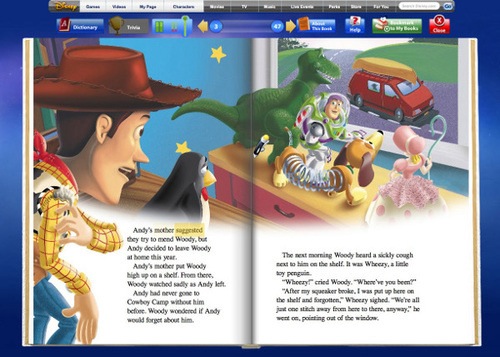
Kind of lost in the scrum at New York Comic Con, even Disney was getting in on the digital comics bandwagon. At the ICv2 Comics and Digital conference, Dario Di Zanni had some pretty confidant things to say about the future of ebooks. Disney has been doing Digital Books for a while — a subscription service for kids to read kids books on the web. With their growing comics publishing ventures — not to mention the team-up with Marvel — a close eye should be paid on what Disney is planning, and it sounds pretty ambitious:
It was during their Mickey Mouse discussion that Disney began to really stress their commitment to digital comic books, going as far as stating that their goal was to have everything published in both print and digital from now on. In the end of November, Disney will be releasing the “Epic Mickey” graphic novel on the Apple App Store with the first issue (of six) being available for free. The remaining issues will be available as a bundle for $8.99.
Blog: PW -The Beat (Login to Add to MyJacketFlap)
JacketFlap tags: Longbox, E-Publishing, Add a tag
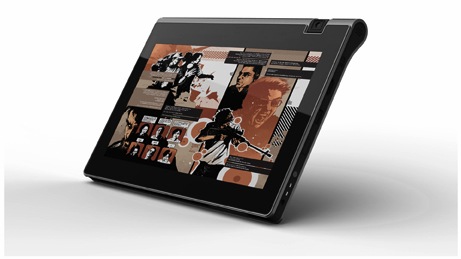
LongBox, the long brewing desktop app for purchasing digital comics, has just gone to version 1.1 and announced that it will be bundled with Norton Ink’s upcoming ADAM tablet, which features a Pixel Qi screen which enables it to be read in even bright sunlight. PR on the move below, but CEO Rantz Hoseley also stopped to chat with Bleeding Cool and reveal some of the reasons why a desktop store is still useful in a world filled with proprietary apps:
I think the ‘Branded App’ approach that a number of publishers have done on the iPad or iPhone is exactly what I had mentioned at a SDCC 09 panel that the industry needed to avoid. For years now, publishers have hesitated to jump into the digital stream, in part, because of the concern of hurting the Direct Market retailers… I honestly thought, based on all of the discussions with creators, publishers, and the various digital companies that comic were going to prove to be smarter than the music, film, TV and videogame businesses, by NOT repeating the same mistakes those industries made. In all of those cases, as they started in the digital space, there was the ‘Sony’ store, the ‘Warner Bros Music’ store, where you could just get their content. Now, those companies make the majority of their revenue from services such as Amazon Digital, iTunes, Zune, Steam, Netflix, etc.
We’re rapidly becoming a ‘cloud’ entertainment society… that your purchase of digital content goes through a multi-channel service, that allows you to access it anywhere, any time. The ‘Publisher App’ just runs counter to that trend, and hence attracts the existing fans… which again, neither grows the market, and has a higher potential for damaging the DM channel, because you are only appealing to people who know these comics, who are passionate about that company’s characters and brands that they are willing to hunt down the app, download it, and pay a price higher than what the casual digital entertainment consumer does. It comes down to the goal… are you building for the long term, or are you simply looking for short term gain.
It’s a salient point. The .mp3 is a pretty universal music format — ecomics coming in a variety of systems and platforms. Is simpler better?
LongBox, Inc. announced today their partnership with Notion Ink, the company behind the much-anticipated ADAM tablet. The partnership places the LongBox Digital Platform as the exclusive pre-installed service for purchasing, cataloguing and reading digital comics on all four of Notion Ink’s announced tablets, as well as any other tablets or portable devices utilizing Notion Ink’s Genesis system over the next two years.
“We’re incredibly excited about this”, said LongBox, Inc. CEO Rantz Hoseley. “Our goal from the very beginning has been to expand the market for comics and graphic novels beyond the current audience served by the print market, so OEM partnerships have been a key focus for the platform. Having a partnership with Notion Ink… ensuring that LongBox Digital will be part of the core entertainment system on all ADAM tablets side by side with their eBook, TV, music and film services… well, that really is a dream come true for us.”
Notion Ink’s ADAM tablet garnered the attention of the tech industry, and Hoseley himself, at CES with its Pixel Qi screen. The dual-mode technology makes it possible to read the screen like color ePaper in bright sunlight, or as a normal LCD screen in dim surroundings. The power of wha7 Comments on Digital News: LongBox launches on ADAM; goes to v. 1.1, last added: 10/13/2010Display Comments Add a Comment
Blog: PW -The Beat (Login to Add to MyJacketFlap)
JacketFlap tags: Dark Horse, E-Publishing, Add a tag
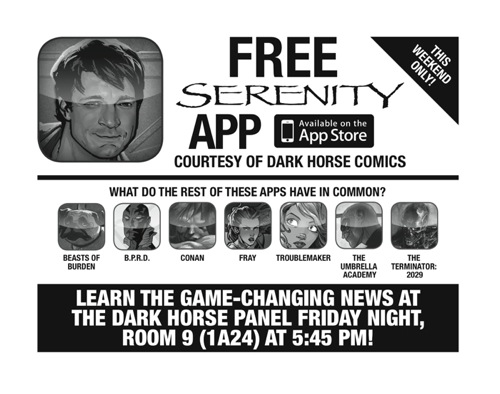
At yesterday’s Dark Horse panel, more details of their digital initiative were announced. It will be proprietary, available on every web browser, and sold for iPad and iTunes. (However, Apple only accepts prices that end in .99 — one of the controlling things that folks were complaining about on Thursday — so it’s not entirely clear how that will work. There will be 170 titles available at first, with some titles available day and date.
Dark Horse had been the last of the big publishers to go digital and by launching their own app and system, it’s obviously a big investment.
While everyone is going digital, further details of the one aspect of the move that seems the most groundbreaking — the in-store exclusive downloads to keep customers going to brick and mortar — were not announced.
To promote the venture, Dark Horse is offering several free comics just this weekend:
Today at New York Comic Con, the publisher that revolutionized creator-owned comics announced a new and ambitious digital publishing plan that’s set to do the same for sequential storytelling in the digital medium! By creating and managing its own digital publishing program—the Dark Horse Bookshelf app—Dark Horse Comics has eliminated third party fees on its digital editions. Not only will readers be able to enjoy Dark Horse comics at lower prices, but comic creators will receive a greater percentage of each digital sale. In short, readers pay less for their comics and creators make more money.
“We are excited by the opportunities offered through this new channel of distribution,” Dark Horse president and publisher Mike Richardson said. “The comics and graphic novels published by Dark Horse will now reach more readers than ever, while creating new customers for traditional brick and mortar stores.”
The Dark Horse Bookshelf app will be available on iPad, iPod Touch and iPhone. Comics can also be purchased and read on modern web browsers at the Dark Horse Digital Store. Launching in January 2011 with comics priced at $1.49 per issue—50 cents lower than the industry standard—the Dark Horse Bookshelf app will be available for download from the iTunes Store and online at digital.darkhorse.com. To drive customers to brick and mortar retailers, the app and Web site will also include links to local comic shops.
Launching with over 150 titles including Dark Horse’s wildly popular horror anthology Creepy, Mike Mignola’s Hellboy and B.P.R.D., Joss Whedon’s Fray and Serenity, Felicia Day’s The Guild, BioWare’s Mass Effect, Robert E. Howard’s Conan, Gerard Way’s Umbrella Academy, Eric Powell’s The Goon and many more, the pricing at the Dark Horse Digital Store offers readers unprecedented value. While single-issue comics will be available at the low price point of $1.49, Dark Horse will also offer an extensive list of free introductory #1 issues. The Dark Horse Digital Store’s comic bundles will group together story arcs spanning multiple issues into easily affordable packages, allowing readers to get the three or four issues that comprise a complete narrative at manageable prices from $2.99 to $5.99. Starting in February 2011, some Dark Horse titles will feature synchronized release in both the digital and print formats.
Dark Horse also has a plan in place that will allow retailers at comic shops and bookstores to offer rea5 Comments on Dark Horse announces $1.49 comics via new app, last added: 10/11/2010Display Comments Add a Comment
Blog: PW -The Beat (Login to Add to MyJacketFlap)
JacketFlap tags: Webcomics, E-Publishing, Add a tag
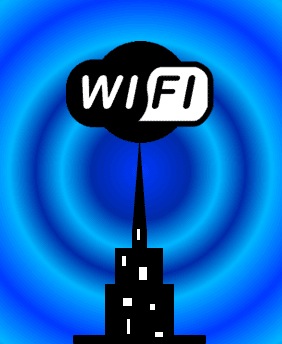 This is Not Comics, but it does shed some light on behavior. While we’re rounding up some scientific jargon, GigaOM reports that millennials need Wi-Fi the way previous generations needed fresh creamery butter. (Millennials are here defined as 17-29 year-olds.)
This is Not Comics, but it does shed some light on behavior. While we’re rounding up some scientific jargon, GigaOM reports that millennials need Wi-Fi the way previous generations needed fresh creamery butter. (Millennials are here defined as 17-29 year-olds.)
According to the survey, commissioned by the Wi-Fi Alliance, almost 70 percent of respondents said they spend more than four hours a day on a Wi-Fi connection. More than half of those polled in the U.S. consider Wi-Fi a necessity in restaurants and malls, and 64 percent of U.S. respondents and 89 percent of Chinese users stated it would be almost impossible to maintain many of their friendships without Wi-Fi. Denying them Wi-Fi would also darken their moods considerably: Three out of four U.S. respondents said they would be grumpier if they went without Wi-Fi access for a week compared to going a week without coffee or tea.
But…see next story!
Blog: PW -The Beat (Login to Add to MyJacketFlap)
JacketFlap tags: World Comics, E-Publishing, Add a tag
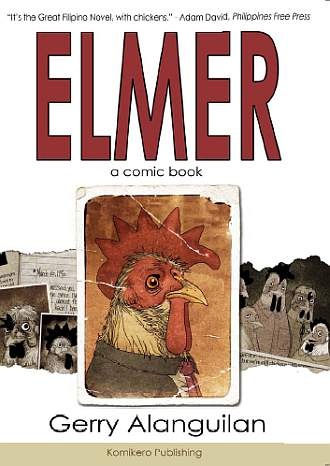 Filipino comics artist/self-publisher Gerry Alanguilan (Elmer), was supposed to deliver an address at a symposium called “Future of the Book” but he was forced to bow out, so instead he posted his speech for all of us to read. While reading the whole thing is the best way to approach it, the gist can be conveyed. Although Alanguilan is basically married to the idea of print publishing, he thinks it can exist with digital:
Filipino comics artist/self-publisher Gerry Alanguilan (Elmer), was supposed to deliver an address at a symposium called “Future of the Book” but he was forced to bow out, so instead he posted his speech for all of us to read. While reading the whole thing is the best way to approach it, the gist can be conveyed. Although Alanguilan is basically married to the idea of print publishing, he thinks it can exist with digital:
WASTED is the title of a comic book that I created from 1994 to 1996. It has gone through several editions in print, the first edition coming out in 1998 through Alamat Comics. In 2000 it was serialized for several months in Pulp Magazine. In 2002, Pulp Magazine published another compiled edition. A few years later, Wasted went out of print. In 2007, I decided to upload Wasted completely online, including a DVD-like commentary for each page at Webcomicsnation.com. It allowed a lot more people to read it, specially those from abroad.
But then, a strange thing happened. I still get letters and emails to this day from people looking for copies of Wasted. I always point out that they can read the entire thing for FREE online. The reaction is almost unanimous and immediate: No, we want to buy the print edition. There is not a comics convention that goes by (and believe it or not, we have something like six or seven of those a year here in the Philippines) that people don’t ask me for a copy of Wasted. The demand has grown so much that I’ve put it in the front burner of my company’s publishing schedule.
Another vote for free sampling.
Blog: PW -The Beat (Login to Add to MyJacketFlap)
JacketFlap tags: End of the World, E-Publishing, Add a tag

Mark Waid has reconstructed his controversial Harvey night speech and made it much clearer what he was getting at: “Yes, Professor Waid, you hippie freak, sharing is all well and good, but how does that pay my bills?” I know. I know. We all still should be financially compensated for hard work so we can keep doing this and make a decent living. No argument. And that brings us back around to filesharing. If you’re genuinely morally indignant about this issue, I understand and respect that. But I worry that a lot of the moral indignation I hear over filesharing is just a way of trying to mask our panic over how our ability to make a living with our art is quickly eroding under the current business models. And I understand that fear. I really, truly do. Look, if you are in comics just to make money, I can respect that. Honestly, no sarcasm. But if you are here to create a sustainable living for yourself while at the same time finding some way to give back to the world, then filesharing is not a problem…it’s an opportunity. Like it or not, downloading is here. Torrents and filesharing are here. That’s not going away. I’m not here to attack it or defend it–I’m not going to change anyone’s mind either way, and everyone in America at this point has anecdotal evidence “proving” how it hurts or helps the medium–but I am here to say it isn’t going away–and fear of it, fear of filesharing, fear of illegal downloading, fear of how the internet changes publishing in the 21st century, that’s a legitimate fear, because we’re all worried about putting food on the table and leaving a legacy for our children, but we’re using our energy on something we can’t stop, because filesharing is not going away.
Much more in the link. Perhaps if Waid had said all this on Saturday, there wouldn’t have been any confrontations, just nodding.
See also David Brothers’ essay on digital comics today on Comics Alliance: Please, Just Kiss Digital Comics On The Mouth Already.:
Here’s the problem with that: Digital comics are not there to support retailers. They are a competitor. They are the new gunslinger in town to blow the head off the old gunslinger. They’re the person trying to break up your marriage. Netflix doesn’t hold back on content, let publishers set ridiculous prices, or send customers to Blockbuster, so why should digital comics do the same?
It’s a common talking point precisely because digital comics are a huge threat to retailers, and since the Direct Market depends on retailers to sell comics, they don’t want to anger their biggest business partners. That’s totally fair; you don’t want to bite the hand that feeds you, and you don’t want to count your digital distribution eggs before they hatch. But at the same time, (and to continue the increasingly ill-advised New Girl In the Building comparison): if you keep holding back and selling yourself short, you’ll eventually be left with nothing. If the digital effort continues to be a half-effort, the failure of digital comics will be a self-fulfilling prophecy. At some point, you need to either make your move or give up.
In the meantime, comics creators were still feeling vag
Blog: PW -The Beat (Login to Add to MyJacketFlap)
JacketFlap tags: Image, E-Publishing, Add a tag
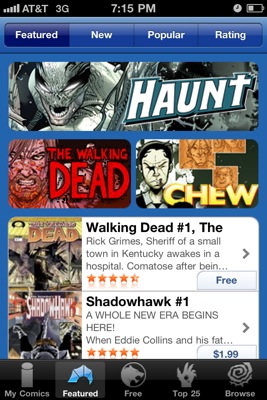 Joining Marvel, DC, Boom and Scott Pilgrim, Image Comics now has it’s very own Comixology app for iPads, iPhones and Ipods. IDW has a bunch of storefronts via iVerse, while Dark Horse mostly sells comcis through their own stand-alone apps. New Image comics are selling for $1.99, which is about industry standard. Initial offerings include Chew, Youngblood, and Savage Dragon. In case you’re wondering what to get first, Chris Sims has a good guide to what to download.
Joining Marvel, DC, Boom and Scott Pilgrim, Image Comics now has it’s very own Comixology app for iPads, iPhones and Ipods. IDW has a bunch of storefronts via iVerse, while Dark Horse mostly sells comcis through their own stand-alone apps. New Image comics are selling for $1.99, which is about industry standard. Initial offerings include Chew, Youngblood, and Savage Dragon. In case you’re wondering what to get first, Chris Sims has a good guide to what to download.
PR below:
Image Comics enters the digital market today with the launch of the Image Comics app for the iPhone, iPad, and iPod Touch. The app, developed on the leading digital comic book platform by comiXology, allows fans unprecedented digital access to the creator-owned comics that Image proudly publishes.
The partnership between Image and comiXology offers Image creators a direct line to digital distribution. Among the independent content now available digitally are Image’s most popular titles, including SAVAGE DRAGON, CHEW, BATTLE POPE and Rob Liefeld’s YOUNGBLOOD. The Image Comics app will also be the first to feature work from Todd McFarlane with the inclusion of HAUNT, created in collaboration with Robert Kirkman (THE WALKING DEAD, INVINCIBLE).
“With the launch of the Image Comics app, we have an opportunity to provide our creators with the digital support that, for many of them, was unattainable before,” says Image Publisher Eric Stephenson. “comiXology has established a very impressive track record of bringing independent content into the digital world. Today represents a milestone in our growth as a company and enables us to increase the availability of the fantastic titles we publish.”
“Our partnership with Image is indicative of our shared vision to help independent creators thrive in the traditional print community as well as the explosive digital marketplace,” adds David Steinberger, CEO of comiXology. “The demand for creator-owned content is at an all time high, and we are thrilled to be able to provide fans with what they want. We’re lucky now to work directly with Image and to offer the creators a clear path to the digital market.”
The Image Comics app is now available for free download from the iTunes App Store. In addition to individual issues for ongoing series, which are priced for $1.99, Image will also offer fans issues of several popular Image titles, sneak peeks of upcoming titles, and other exclusive content for free.
Blog: PW -The Beat (Login to Add to MyJacketFlap)
JacketFlap tags: E-Publishing, SDCC '10, Add a tag
 by special correspondent Bruce Lidl
by special correspondent Bruce Lidl
Techland Presents: Comics and Digital Piracy
A “hastily thrown together” panel on the last day of the Con made for some lively discussion about the realities and moralities of pirated comics.
Moderator Douglas Wolk from Techland.com, a long time music critic, is concerned that the comics industry will fall into the self-destructive pattern that the music industry pursued, spending enormous sums of money to try to get the digital genie back in the bottle, without doing much of anything to slow file-trading down and instead alienating many of its most ardent fans. Wolk also observed that there is now a generation of comics fans that is accustomed to having a digital copy of every new comic released each week, in an open format, on that Wednesday, for free. Not to mention the fact that essentially every comic book ever published in the US is just a few mouse-clicks away from a free download.
Jake Forbes and Deb Aoki discussed in detail the particular permutations of the large “scanlation” community of Manga readers that grew specifically out of the unavailability of so many Japanese comic books in English. While things are changing, the overall situation remains as the huge output of the Japanese comic industry only trickles out slowly to non-Japanese readers. As hard-core manga fans themselves, Forbes and Aoki claimed they could understand the passion of the fans, but at the same time, as editors, they were dismayed by the arrogance and short-sightedness of “scanlators” that self-righteously ignored the desire of creators to make their own decisions about the distribution of their work.
David Steinberger from comiXology, the provider of the technology behind both Marvel and DC’s iOS offerings, diagnosed the situation primarily in terms of the disconnect between the speed of technological developments online and the business pace of the large companies and their licensing requirements. He would love to do more day and date releases, he said, but the fear of cannibalizing direct market sales, and the “bottle neck” of his small start-up’s capabilities continues to slow the trend in that direction. Steinberger considers those fears to be “irrational” as his best sellers tend to be comics that have a higher mainstream profile from movies, such as Wanted, Hellboy, Kick-Ass, etc. To him that demonstrates that digital sales come from non-traditional comics fans, precisely not the people in their local shop on Wednesdays. The non-US component of his customers (over 40%) would also seem to argue against a corollary between digital purchasers and hardcore weekly fans. Steinberger also contends that unauthorized downloads should not be equated simply with lost sales, as in his experience, people tend to grab a great deal of free stuff without ever actually consuming all of it, or certainly ever thinking of buying it. Steinberger does betray an acute understanding that his business exists in a challenging position, having to work within the often byzantine restrictions from publishers while at the same time competing with free. comiXology’s answer is overwhelmingly based on quality of experience, or their ability to create a digital version of the comic pamphlet that is qualitatively better than what a pirate can provide, and that requires far less technical know-how.
None of the panelists directly responded to Wolk’s concerns about the wisdom of maintaining an adversarial relationship with down-loaders, as in his view, strict enforcement has proven utterly ineffective for slowing unauthorized distribution, A punishment based approach can also be problematic because it overlooks the possible positive effects of widespread unauthorized distribution, particula
Blog: PW -The Beat (Login to Add to MyJacketFlap)
JacketFlap tags: SDCC '10, '10, E-Publishing, SDCC, Add a tag
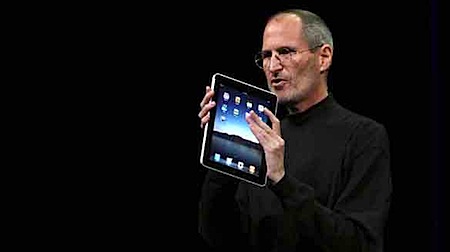
by special Beat correspondent Bruce Lidl
Late Thursday afternoon, as Comic Con began to really hit its stride, as the shift from panel and show floor to party mode started to occur, the second annual “Digital Comics Now!” panel, hosted by Chip Mosher of Boom! Studios got underway. In some ways the panel is a barometer for where digital comics stand in 2010. Many of the same faces from 2009 appeared, including David Steinberger from comiXology and Michael Murphey from iVerse, while new members were Wade Slitkin of Panelfly and Micah Baldwin from Graphic.ly. Noticeably absent was Rantz Hoseley from Longbox, an ubiquitous presence at the Convention in 2009.
There was breaking news right off the bat, with Slitkin announcing that Panelfly was about to disappear and is merging with some other multimedia properties into a new entity to be called “Syn.” Details were sparse, but it would appear that at least one of the players in the digital comics space is exiting. In general, though, the rest of the panelists were cautiously bullish on the prospects for digital comics, particularly based on the growth in availability and sales for comics distributed online (primarily via Apple properties, an element that remains consistent from 2009). Steinberger was comfortable representing the admitted industry leader, as comiXology has the largest library of available titles, with over 2300 books he claimed.
Micah Baldwin from newcomer Graphic.ly was happy to play the role of the bigger thinker, and to emphasize what he sees as his company’s key differentiator, social and community features. Murphey from iVerse seemed to be speaking for all in the group in characterizing the necessity of depending so much on Apple to be an acceptable reality and that some of the early problems around the iTunes have been ironed out, and things were “just not that bad” anymore.
Mosher challenged the panelists to explain how digital comics were going to expand the overall comic book market beyond what his research characterizes as the “300,000 regular weekly shoppers” at the 1800-2000 brick and mortar shops in the U.S. Here the answers were very similar to a year ago, highlighting the potential benefits of bringing comics to non-traditional readers via technology, and to capitalize on the general pervasiveness of comic IP in the culture generally. Steinberger claimed that the retailers participating in comiXology’s program had seen sale increases of “20%” but the general feeling was that digital comics were still too new to for much comprehensive data to be collected yet.
To this observer, the most interesting comment from the panel was really more of a question. Baldwin from Graphic.ly, an admitted “non-comics guy,” talked about the on-going search for that element that will be the tangible answer to the change in revenue streams brought on by digital. In his view the music industry has forcibly shifted its priorities to live concert sales over individual unit sales. He wants to know “what will be the live music” of the comic book industry, which is a very interesting question for the CEO of a company that sells digital copies of comic books to ask. Digital comics are, after all, the mp3 in this analogy, and it is the physical comic books that are the scarce good that can still be charged for, like music performances. The price pressure on digital copies is likely to increase in a downward direction, as we have seen in other industries, including book publishing. Because of the intensely collectible and visual nature of comics, far greater than CD’s or books of course, comics sales are likely to remain far more dependent on physical sales than those other media, while the successful price of digital comics are, in my opinion, almost assured
Blog: PW -The Beat (Login to Add to MyJacketFlap)
JacketFlap tags: Events, E-Publishing, Add a tag
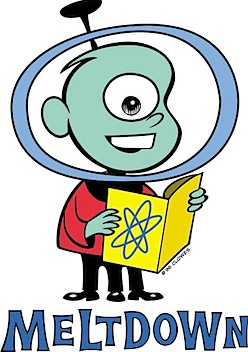 If you are not going to the Big Show or want to get a head start on the activities, here’s an interesting-sounding event, Meltdown’s Digital LA – Digital Panel: Abs & Apps . A ticket is $25 but includes networking and schmooze time. The speaker lineup alone is impressive:
If you are not going to the Big Show or want to get a head start on the activities, here’s an interesting-sounding event, Meltdown’s Digital LA – Digital Panel: Abs & Apps . A ticket is $25 but includes networking and schmooze time. The speaker lineup alone is impressive:
Scheduled speakers include: - Marvel, TBD @Marvel (previously scheduled Ira will not be able to join us due to another commitment)
- David Steinberger, CEO of comiXology, which built Marvel and DC comics apps, and its own app of upcoming releases @comixology
- Sam Humphries, comic book writer (Fraggle Rock, CBGB), architect of MySpace Comic Books
- Chip Mosher, BOOM Studios, Marketing Director
- Rich George, IGN Comics Editor @IGN
- Jason Badowar, comic book illustrator (Heroes, True Blood etc.) and co-founder of WEvolt.com, an online platform which digitally distributes and monetizes comic book content via deals with Universal Music, Arcana, and more.
- Micah Baldwin, CEO of Graphic.ly, which creates apps to digitize graphic novels and provides social tools for publishers including Marvel, IDW, BOOM, Top Cow- M
Moderator: Kevin Winston, Digital LA, founder, former MySpace Integrated Marketing of Movies, Comic Book Channel, Games
Blog: BookEnds, LLC - A Literary Agency (Login to Add to MyJacketFlap)
JacketFlap tags: e-publishing, e-readers, Add a tag
I would love to hear your perspective on the topic of e-readers and their impact on us as social creatures. Growing up, I was surrounded by books, and to this day I love to touch, feel, and read them . I gauged whether a man was "date-worthy" depending on not only whether he had a library of books but more important, whether he read the classics. Have you ever spied on someone at the grocery store and painted a fairly quick picture of them based on what they purchased? The same goes with personal libraries.
My son was born last year and I try to envision what the world will be like when he's my age (41) and everyone's library is stored in a small electronic device. If you want to draw a New Yorker-style cartoon in your head, the future home libraries will still have the overstuffed leather chair and the tasteful red Persian carpet. The bookshelves stand empty and in one stands a lone Kindle.
Respecting your thoughts and opinions, I would love to hear what you think about e-books and the inevitable death of the paper book and hope to read a blog one day on this topic.
The strangest thing about this question is that on the same morning this landed in my inbox I had been thinking the same thing. I was walking down the stairs in my house eyeing the bookshelf overflowing with books and wondering if my children and their children and their children’s children would love books a little less because they won’t be surrounded by them?
As a child I too was surrounded by books and was often encouraged to read based on the books in the bookshelves around me. In other words, the books themselves inspired me to read. I remember sitting at friends’ houses and scouring their bookshelves, and like this reader, I remember gauging my interest in other people based on what they read. In fact, I remember meeting people and talking to strangers on the subway all because one of us was reading a certain book.
I do think that a world of e-readers will change that and I hope it doesn’t change things for the worse. Will children, will people, be less inspired to read because they don’t have walls of books to grab their interest? Will strangers avoid spontaneous conversation because an e-reader has no cover and there’s no way to know what someone is reading, there’s no opening for an offhand comment about the book one is reading?
I guess, when you think about it, it’s a little like the loss of the front porch. There was a time when the front porch was the heart of a neighborhood. People didn’t drive everywhere, they walked. People didn’t sit inside, in the air-conditioning, in front of TVs, they sat on the front porch to keep cool and talked to neighbors as they passed by. In fact, they sat on the front porch and read books.
I like my e-book. I still really like paper books. I certainly think e-books are the wave of the future, but I’m not entirely convinced they are going to fully replace paper books any time soon. I don’t know what’s going to happen to readers and to “the love of books.” But it certainly does give one much to think about.
Jessica
Blog: KC Oliver's Blog! (Login to Add to MyJacketFlap)
JacketFlap tags: Young adult author, e-book, e-publishing, Add a tag
Publishing is such an extensive subject -- with large publishing houses, smaller publishing houses, e-publishing, POD (print on demand) publishers, and self-publishing.
Since this subject is so generous, I'm going to break it down into separate blogs. Granted, I'm no expert on the subject, but I can draw from my experience -- starting with e-publishing.
I remember when books that were e-published were not considered to be 'real books'. Trust me, it's sad to hear that, because e-published authors aren't the only ones to contend with that stereo-type. I'm published through a smaller publisher with a small print-run, and even with an actual print-run, I had to really push that I was a 'real' author because my publisher wasn't well-known. I will elaborate more on that in an upcoming blog.
I have to admit that I do understand the hesitation of some to accept e-published books. In the earlier days of e-publishing; demand was very low, and it was thought that the only people who got e-published were those who couldn't get picked up by a 'real' publisher. That's a tough reputation to overcome. And, in all honesty, there were and still are some poorly edited stories popping up. But hey, that's happened with even the most reputable, larger publishing houses.
That being said, wanting to be e-published is a choice. It offers some pretty good incentives, yet some pretty big draw-backs too.
Some incentives are e-books are cheaper for the consumer, environmentally friendly, and have a low overhead so the author gets a bigger cut of the royalties. That's pretty sweet. And with all the new e-reader devices, the future looks bright!
On the other hand, you won't see your book in bookstores or libraries. The stereo-type of not being a 'real' author will be an issue. You will need to promote yourself online A LOT to get your name out there and sell e-books. And what if you want to do book signings? Of course, some e-publishers do offer a POD (print on demand) option. So, you could order books for a signing, but you would need to purchase the books first, and unfortunately, some bookstores can be unreceptive to POD authors.
Have I turned you off of e-publishing? I hope not, cuz like I said earlier, it really comes down to an author's choice. You need to ask yourself: What do I want out of my career as an author? How big do I want to go? How much time do I want to invest?
Once you know the answers to these questions -- your choice should be easy.
Blog: PW -The Beat (Login to Add to MyJacketFlap)
JacketFlap tags: E-publishing, Add a tag
Wow, the iPad announcement really didn’t solve everything! In fact the battle lines over who gets what with ebooks and i-that may just be beginning if this weekend’s skirmish between Amazon and Macmillan is any indication. Johanna Draper Carlson has the back and forth — basically, Macmillan — publisher of such graphic novel imprints as First Second, Hill & Wang and Seven Seas — demanded its ebooks be priced at $14.99 as opposed to $9.99. And Amazon said no way, Jose, and pulled ALL Macmillan books from Amazon.com over the weekend. While literary fires raged, yesterday, Sunday, Amazon gave in and said they would carry Macmillan ebooks for Kindle at the suggested price.
It’s all part of a larger pricing battle — while in general, it’s hard not to be sympathetic with the book publishing’s desire to survive, charging for the cost of a nice trade paperback for a few bits and bytes is kinda ridiculous. The NY Times writes:
For more than a year, publishers have been fretting about the price of digital books, which Amazon, as the dominant player in the fast-growing market, had effectively been able to set.
Last Thursday, Mr. Sargent flew to Seattle to explain the pricing and new sales model to Amazon. He said Amazon could continue to buy e-books on the same terms it does now — allowing the retailer to set consumer prices — but that the publisher would delay the release of all digital editions by several months after the hardcover publication.
Amazon buys and resells e-books in the same way it handles printed books, by paying publishers a wholesale price that is generally equivalent to half the list price of a print edition. Because Amazon has discounted the price of most new and popular e-books on its Kindle e-reader to $9.99, it loses money on most of those sales.
There’s much more commentary on the net about all of this, as one might imagine Tom Spurgeon weighs in here. Cory Doctorow has a long piece at Boing Boing that paints a clear picture of the obvious. The reader is gonna be the biggest loser in all these e-wars:
And if one of the five titans that control almost all of publishing gets into a scrap with one of the four or five titans that control almost all ebook publishing, or the one company that rules the audiobook market, the collateral damage is that you will have to choose to eschew a gigantic slice of all the literature ever made in order to hang on to your library, or abandon your library in order to get access to that publisher’s work. Or fill your shoulderbag with a half-dozen tablets and readers, one for each permutation of which corporate elephant is trying to crush another.
Blog: PW -The Beat (Login to Add to MyJacketFlap)
JacketFlap tags: E-publishing, Add a tag

Whether you’re basking in the afterglow or fretting unfulfilled, the tumultuous excitement of the iPad announcement has come…and gone. The reactions seem evenly mixed between the rapture and the crapture, with tech site grumbles loud and clear. Annalee Newitz at io9 has a well thought out complaint:
The iPad promises to be just as revolutionary as its predecessors, for one reason. It embodies, as much as possible, the mythical convergence device that technophiles have been craving for almost two decades. The convergence device, which people began to discuss seriously in the 1990s, would be a unified gadget where you could consume many kinds of media, especially TV and the web, with the same gadget.
In the end, she argues, the iPad is more of a dedicated device, as opposed to the amazing Tricorder: lacking multitasking, like a TV, it tunes into one function at a time. In that regard it is certainly not the be-all and end-all.
The mood is more hopeful among Big Media types, probably because they are fucking desperate for a white knight at this point. They want someone –anyone — to rescue themselves from the black hole they have gotten into.
Hope that paywalls — increasingly erected by such newspapers as the WSJ, with the NY Times following suit eventually — would be a solution were firmly dashed by the horrifying results of the Newsday experiment. The “fourth” daily in the New York Area, Newsday is known as the daily paper of Long Island. After putting their content behind a paywall for three months, the total number of paid subscribers at $5 a pop?

You can bet that number is haunting a lot of people. You could literally have made more money with a dinky display ad for a week. Of course there is a caveat:
The reason for this awful performance, according to Newsday, is that the website’s offered for free to “Millions of Cablevision customers in the New York tri-state area and 75 percent of Long Island households, including all Newsday home delivery subscribers, now have exclusive access to newsday.com at no additional charge,” Newsday said in a statement reported at Paid Content.
Watching the listed reasons why Newsday got only 35 people in three months is totally funny, and shows to what lengths people will go to protect a dumb idea. All of the points made miss a common fact of Internet life: people pay to be entertained, not informed. It’s easy to click from one site to the other to get what the user considers is the same information.
While Apple seems eager to be the middle for saving Old Media, despair over these kinds of figures isn’t helping any.
I, for one, am not champing at the bit to get an iPad — a feeling I’m sure will change once I actually see one, but for now, I’m happy with my wee little iPhone. And, perhaps oddly, I see the lack of multitasking as more of a benefit for the iPad/iPhone appliance. If this is the gadget that will save books, why the hell would I WANT to be doing 20 things at once? The appeal of “Curling up with a good book” is part of why e-readers have comfy cozy “K sound” names: Kindle, Nook. I do not want to read Wuthering Heights, answer my email, retweet, look
Blog: BookEnds, LLC - A Literary Agency (Login to Add to MyJacketFlap)
JacketFlap tags: e-publishing, small presses, Add a tag
I am an unpublished writer of erotic romance, finally ready to stick it out there to see if anyone grabs hold (pardon the bad pun). Now on to the question. There are several publishers of erotic romance, both paper & e-pub, whose websites state they welcome un-agented submissions. Is this a good route to follow in this genre, or would you recommend attempting to land an agent instead?
This is one of those answers, whether you’re writing erotic romance or any other type of book, that’s going to depend on what you want from your career as a writer and what your thoughts are about starting that career. Since I don’t know any more details, here are my thoughts in general.
There are a lot of smaller presses and epubs out there who have really done well in launching and promoting new authors in genres that might not be or previously weren’t widely accepted in New York. Many authors initially went there hoping to launch a career, but mostly just hoping to get work published that they knew wouldn’t be picked up anywhere else. It worked of course and worked well because we now have New York houses that have created entire imprints based on what these epubs were doing. We also have deals between the epubs and New York houses to reprint some of their most successful material.
I’m not sure, however, if it makes sense to target these smaller houses first if what you’re doing also fits what New York might be looking for (and by New York, by the way, I tend to mean the major houses). So here’s what I would do. I would look for an agent. Since you seem happy to be published by a smaller house or an epub, give yourself a reasonable amount of time to find that agent, let’s say 9 months to a year. If in that time you’ve had little success or have not received any offers, you should at least have your second (next) book finished. Send your first one off to the smaller houses you have in mind for possible publication and start querying agents with your second book. Make this your pattern until you have an agent and are ready to take those next steps to a career in New York.
Launching a career in epubs or smaller houses has definitely been successful for a number of authors (a number of mine included), but primarily because there was nowhere else to go with those books. I’m not sure I would say that’s the route to take if you know New York is looking for just the kind of work you’re writing. As for finding an agent, it’s the rare agent who will pick up your book with the sole intent of selling it to a small press or epub. Most of us are thinking New York. It’s where the money is and hopefully (at least for now) where the bigger careers seem to grow. That doesn’t mean we won’t sell to a smaller press, it just means that we are aiming higher than that.
Jessica
Blog: PW -The Beat (Login to Add to MyJacketFlap)
JacketFlap tags: E-publishing, Add a tag
 Gizmodo rounds up the latest evidence on whether Apple is actually developing a “tablet” and digs up a pretty compelling case that not only is it underway, but Apple is actively seeking to get print ported over to the device:
Gizmodo rounds up the latest evidence on whether Apple is actually developing a “tablet” and digs up a pretty compelling case that not only is it underway, but Apple is actively seeking to get print ported over to the device:
Two people related to the NYTimes have separately told me that in June, paper was approached by Apple to talk about putting the paper on a “new device.” The R&D labs have long worked on versions of the paper meant to be navigated without a keyboard or mouse, showing up on Windows tablets and on multiple formats using Adobe Air. The NYTimes, of course, also publishes via their iPhone application. Jobs has, during past keynotes, called the NYTimes the “best newspaper in the world.”
Apple is also talking to textbook publishers, it is said, with a look to moving expensive textbooks to a more portable form. Gizmodo concludes:
Some I’ve talked to believe the initial content will be mere translations of text to tablet form. But while the idea of print on the Tablet is enticing, it’s nothing the Kindle or any E-Ink device couldn’t do. The eventual goal is to have publishers create hybridized content that draws from audio, video and interactive graphics in books, magazines and newspapers, where paper layouts would be static. And with release dates for Microsoft’s Courier set to be quite far away and Kindle stuck with relatively static E-Ink, it appears that Apple is moving towards a pole position in distribution of this next-generation print content. First, it’ll get its feet wet with more basic repurposing of the stuff found on dead trees today.
Obviously, comics and stuff are going to fit in there…somewhere.
Blog: BookEnds, LLC - A Literary Agency (Login to Add to MyJacketFlap)
JacketFlap tags: romance, RWA, e-publishing, Add a tag
As you read this Kim and I are boarding Amtrak for Washington, D.C.’s, Union Station. Today is the start of the RWA National conference and I love that I get to take the most romantic form of transportation to get there. There’s something about a train that just calms, relaxes, and excites me. Have you ever noticed that nearly all children, at some point or another, fall in love with trains? Amazing since so few actually get to ride or even see them regularly. Well, I for one have never outgrown that fascination.
Like trains, I think books hold their own form of romance and I think that for many, the hesitation toward ebooks, ereaders, and epublishing is the loss of romance. Will a book still hold the same fascination when 90% of what we’re reading comes electronically? Or will ebooks be the air travel of today? No more peanuts, no more toothbrush, and no more waving to friends and family from the jetway, just serving the purpose we need them to serve? There’s no way of knowing for sure what is going to happen to books. Only time will tell, right? The one thing I do know is that for those of us involved in publishing (and that means those of you who read the blog too), no matter what happens our romantic fascination with reading and the written word will never go away. In fact, I’m not even convinced that the bound paper book we know today will go away. Just like trains, those paper books will have their problems, but hopefully, at least for the romance of it all, they’ll stick around in some fashion or another, because, while I love my Kindle, nothing beats the smell, feel, and versatility of paper.
For the next two days (three if you’re lucky) I’ll be posting directly from the conference. For those of you who are not part of the romance community, or have no interest in it, I will try to make sure my posts cross genre lines as much as possible. For now, though, I’m going to sit back and enjoy the clickety-click of the train as we head through the cities and countryside of the Northeastern United States.
Jessica
Blog: BookEnds, LLC - A Literary Agency (Login to Add to MyJacketFlap)
JacketFlap tags: kindle, e-publishing, Add a tag
It seems like it’s the only thing book people talk about, the Amazon Kindle, the Sony Reader, and how they’ve changed their lives. From editors, authors, and agents we hear about the revolution of ebooks and how paper books are coming to an end. But is that really the case?
I have jumped on the Kindle bandwagon and I’ll admit that so far, so good. It’s not perfect and you can tell it’s not made by Apple (of which I’m a huge fan), it’s just not that fancy. It doesn’t have the bells and whistles that an Apple "ibook" would probably have. But it works and it works remarkably well. I haven’t yet used mine to read a purchased book, but I have used it to read a number of manuscripts and it’s made my life so much easier. Just imagine traveling with one small book containing four manuscripts rather than shipping the manuscripts to my destination (which is what I used to do).
What has been really interesting to me is the reaction of others when I tell them about my Kindle. One friend, a real techie (he waited in line for hours for his iPhone the day it was released) immediately asked me my thoughts and wanted to know details. He is not much of a book reader, although he did have one remarkable year when his goal was to read a book for every letter of the alphabet. He started with an author whose last name began with “A” and went through the alphabet until he hit “Z.”
Another friend, a former publishing colleague, and someone I consider incredibly well read, had no idea what I was talking about. He’d never heard of the Kindle and knew nothing about ereaders.
My mother, who is an avid online shopper, including Amazon, and a huge reader, had never heard of it.
My assistant had never heard of the Kindle until she started working here and saw the one Kim purchased. Obviously she loves books and is an avid reader.
Now of course all of these people had these reactions before Oprah made her recent announcement (and devoted a half hour of her show) that the Kindle is one of her favorite things. However, if you watched the reactions of those receiving their free Oprah gift you might also notice that for every person who was overjoyed there were two who were confused and a fourth looking for her car.
So what does this say about the future of ebooks? It says that I have a very, very small sampling, but it also says that the future is a lot farther off than many are predicting. Even with Oprah’s powerful stamp of approval? you ask. Yes, because I remember very clearly just a few short years ago when the Sony Ereader was one of Oprah’s favorite things.
While true publishing professionals and Oprah have quickly latched on to the idea of an ebook, there are still many, many people out there who have no idea what we’re talking about. Will ereaders be the end to books in the same way mp3s have been the end of CDs? I can’t think that way. It sounds so negative and dour and I just don’t believe that if it happens it will happen anytime soon. For one thing, mp3s have a different music quality. Ereaders are unlikely to change the quality of the written word and I have yet to see an ereader that will make reading a children’s picture book as enjoyable as a “real” book. The graphics just are not going to translate. Yes, it’s clear changes to the publishing industry need to be made and will be made, but let’s not think of it as an end to anything, but as a fun new addition, the same way mass market paperbacks were once new.
Jessica
Blog: BookEnds, LLC - A Literary Agency (Login to Add to MyJacketFlap)
JacketFlap tags: e-publishing, Add a tag
When the Amazon Kindle was first launched the publishing world was buzzing. It’s pretty, it’s convenient and it’s the best e-reader yet to be released. But what is this really going to mean? Should authors start thinking about selling older books?
It’s funny that whenever a new venue for publishing emerges (a new house or a new technology) the immediate reaction of authors is to try to sell all of their older books. Why? As the head of any company or corporation knows, you are only as good as your last product. In other words, as a writer building your brand and your career you're only as good as your latest release, so why would you make that latest release an old book that maybe isn’t as good as what you’re currently writing or not even in the same voice? Just because there’s a new venue for your books doesn’t mean everything you’ve ever written should be plopped into it.
The Amazon Kindle and other similar technologies will only work if readers want to read and buy the books made available to them. If your books weren’t viable in the market before, it’s unlikely they are now, unless of course something major has happened to your career to change that, but we’re not going to go into the exceptions at this point.
What I foresee in e-publishing as well as traditional publishing is a greater need for ebooks. I think more people will buy books electronically and read them that way. Do I see an end to paper? Not anytime soon, but I do see a change. I think more nonfiction will go electronic before fiction. It will be so much easier to update nonfiction titles continuously when they are published electronically. How great would it be if your new purchase, a book on breast cancer treatments, can be updated by only purchasing one chapter?
Kim just recently got a Kindle and I’m sure she’ll comment. I haven’t been swayed yet. I love it for its weight and size. Certainly it seems more convenient for travel, and I really love the thought of downloading my submissions to a Kindle and reading them that way. To me, though, there are still some chinks in the armor that need to be worked out before I’m swayed completely. I’m sure I’ll be an ebook reader before too long, but I can’t imagine that it will be the only way I read books. But what about you? How do you feel about this new way of reading and why do you feel that way?
Jessica
Blog: Middle of Nowhere (Login to Add to MyJacketFlap)
JacketFlap tags: scribbles, Old Cotswold Legbar eggs, Clarence Court, bird men, scribbles, Old Cotswold Legbar eggs, Clarence Court, bird men, Add a tag
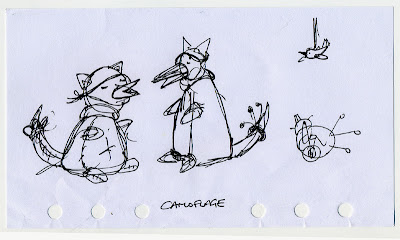
At a glance it looks like black and white spaghetti. When or if I get round to working it up, then it will make more obvious sense to the onlooker. But this one is just a memo for me, and will probably end up in the woodburner.
Now the other one, from last night, is in one of my precious Moleskines, and I do tend to be a bit tidier in them; a bit like minding one's P's and Q's with a respectable aunt. I was still ruminating about bird masks, and was trying to think of a way of depicting people withough resorting to human-types.
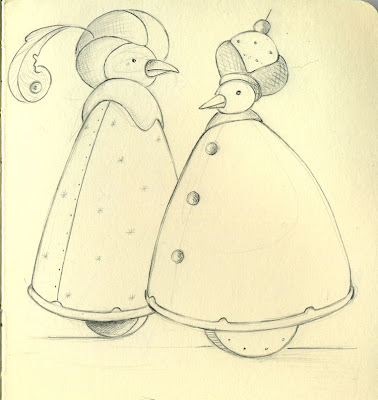
I rather like the way the cone-people are going, all kinds of interesting twists to be had on that theme. And just because I have a new camera and I want to play with it - lovely blue-green Old Cotswold Legbar eggs, from Clarence Court. (Almost) too pretty to eat.




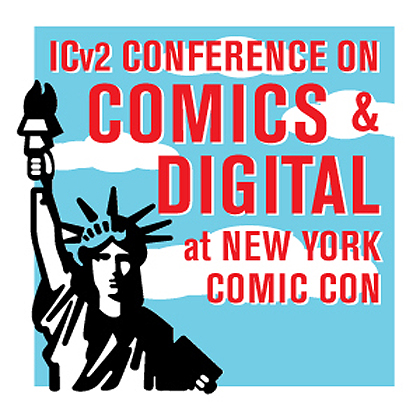

A thoughtful series of posts. Thanks for giving your two cents on this hot topic-you definitely gave me something to think about this morning.
The various digital retailers are also a pretty good way to place work that doesn't fit well elsewhere because of length: short stories and novellas. I placed a longer short story under my usual pen name that had already been published in a literary journal. I ended up selling about 2,000 copies and getting some very nice reviews. Not a fortune at 35% of the .99 cent price, but certainly good promotion for my novels and my author brand.
And thank you, Jessica, for clarifying the terms you used. ePublishing shouldn't be confused with self-publishing, as I'm sure the nice people at Carina, Samhain and the others would want emphasized. The GOOD ePublishers provide editing, copyediting, coverart and promotion.
There is also an aspect to this you didn't point out, which is understandable because there are so many new factors to consider.
Up until a few years ago, many erotic romance authors were submitting short stories to print publishers for anthologies. These authors were paid a small flat fee and there were no royalties involved. Which was fine...it was expected...an no one cared. It was more about building publishing credits than making money.
However, when the authors submitted to these publishers the authors had no idea that the print anthologies would one day become kindle e-books. The contracts were worded ambigiously and none of these authors are getting royalties on the e-book sales now. In some cases, the authors have moved on to e-publishers and these back listed books are now competing with their newly released e-books. In my case, they are all listed on goodreads right along with my newer books and readers have no idea they are not supporting the authors when they buy the back listed books.
But thanks to self-publishing e-books, and contracts that read "non-exclusvie" these authors aren't totally screwed. They can now re-release their own short stories as stand alone e-books and collect the royalties they deserve.
I'm considering e-publishing, but where can one find a list of legit e-publishers? Thanks.
Anon: Amazon. Who else do you need? Someone to take your royalties in exchange for editing and cover art? Develop your own stable of professionals to handle these things for you. Pay them up front. Publish with Amazon at $2.99 or less and you've got 70% forever, never go out of print.
To the above anon, I say "forever" or until Amazon changes things up. They cold decide to stop selling ebooks, or to switch to a new model and only feature those under the new model. Never know.
Thanks for this informative series of posts from your perspective. From non-writers I constantly hear: Why do you need an agent or a big publisher? Just e-publish yourself! It's so frustrating.
http://tericarter.wordpress.com
In response to anon @ 11:37 am
I've experienced this, too. And I'd like to suggest one thing to all new authors who are submitting short stories to traditional publishers who are doing print anthologies:
Don't settle for the flat author fee anymore, and let them know it. These print books are going to become digital, they will be around for a long time gaining new readers, and you should be getting a percentage of the digital royalties you deserve. And if the publisher won't agree, don't submit. There are plenty of reputable e-publishers out there looking for new authors who are willing to pay royalities on e-book sales for short story anthologies...as well as a flat fee up front. I'm not talking about millions of dollars in your pocket. But these publishers are very sneaky and they are making profits now thanks to e-books they never thought they'd make.
At the very least, make sure you sign "non-exclusives," so you can self-publish down the line if you wish.
If I were concerned that my older books were not as "good" as my recent ones, I would republish them as eBooks under a pseudonym.
Same if I were worried about books in a different genre than where I'm currently most popular.
Jessica, I'd like to repeat my question from yesterday's post, because obviously I'd like to know your thoughts, and because I don't think I'm the only one wondering:
Does e-publishing "ruin" an aspiring writer for agents?
Full question/background info here: http://bookendslitagency.blogspot.com/2010/11/launching-your-career-via-kindle.html?showComment=1290435653384#c8942652961795586712
Thanks!
Kristan
I can answer the question, Does e-publishing 'ruin' a writer for agents, for you, Kristan:
Answer: Not if your e-book sells! If it doesn't sell, then change your name, cuz Amazon = New Slush Pile, and the Book Buying Public = the new agents.
To anon at 12:02
good epublishers that I recommend
Samhain Publishing
Carina Press
Loose -ID (for erotic only)
they have good editing and great cover artists
It's not that agents are going away. Established writers still need them, because the more deals you have, the more help you need. But what's changing is the role of agents for NEW (meaning, as yet unpublished for significant money) writers. New writers no longer need agents to break in. If it sells well enough on Amazon, the agents and publishers will come to YOU. So in my mind, it's a waste of energy for a new writer to worry about an agent, indeed, to worry about anything but writing the best possible book and having it sell.
You know, when we decided to pay royalty shares to authors on anthology inclusions, rather than flat fees, we were given some rather funny looks.
That was a head scratcher. As far as I was concerned, as an author, I'd rather have a share of unlimited digital and POD (which stays on market forever) than a one-time payment.
It's nice to know that authors are coming around to this idea.
This is so interesting. In an age when everyone wants to be published or remain a published author the lure of going it on your own by self-publishing is strong.
But as stated there are many issues to consider as there are in any business decision. Thank you for posting this.
Stella
One thing I think this post overlooks is actually the most important (to me) aspect of self-pubbing e-books: freedom. I've had ten books published by four big five companies and had a great time with them. But there have also been book ideas that were deemed insufficiently commercial - mostly things outside my normal genre -- that ultimately went unwritten.
What e-pub means to me is that I'm free to write any book I want -- just as a painter is free to paint any picture he wants -- without having to convince a publisher that it'll be worth their very considerable investment. This has been creatively explosive for me. I'm working on one book for commercial publication and two for e-book publication. As a novelist, I've never felt this free.
I have to agree with Timothy. How many times have authors and agents heard the comment from editors, when a manuscript or outline is under consideration, that they are rejecting it because they don't feel it is marketable? I ran across this a few years back, after one of my books (The Iron Rose) was praised by Publisher's Weekly as being one of the top seven fiction books released that year. I write Historical Romance, so that was doubly exciting. Yet when I informed my editor that I planned to write a sequel, which was in response to enthusiastic demands from my readers...I was told it would likely be "unmarketable" that "pirate books" were not selling. Hmmm. Wonder if anyone told Michael Crichton that when he submitted Pirate Latitudes?
Bottom line is I still have the bones of that manuscript and now I'm free to flesh it out and publish it myself.
Timothy Hallinan and Marsha echo my concerns. I have been traditionally published, but as I've started to write stories that veer from the mainstream, and with houses who celebrated less conventional projects (like Tricycle Press) unable to stay in business, I worry that my stories may not find a home among traditional publishers. With self epublishing, I'm free to explore the quirky projects, while still doing other more mainstream work. But quality is also a big concern for me, which is why I have not done it... yet.
". Wonder if anyone told Michael Crichton that when he submitted Pirate Latitudes?"
Actually, Crichton never did submit PL, it was dredged up posthumously from his computer in order to keep him going.
Tricycle Press--which has published a lot of great books that are out of the mainstream--still exists. Random House acquired it about a year ago but the editorial office remains in California, and at least for now the press is continuing to bring out those types of books that built its reputation, including the recent Americas Award winner in the picture book category, Carmen Tafolla's bilingual What Can You Do with a Paleta?/¿Qué puedes hacer con una paleta?
Great post! And a lot of good points to consider!
Lee